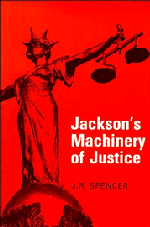Book contents
- Frontmatter
- Contents
- Acknowledgements
- List of figures
- List of tables
- Preface
- Preface to the first edition of ‘The Machinery of Justice in England’
- Abbreviations
- I Historical introduction
- II Civil jurisdiction
- III Tribunals
- IV Criminal jurisdiction
- 19 Courts with original criminal jurisdiction
- 20 Coroners' Courts
- 21 Courts with appellate criminal jurisdiction
- 22 The process of prosecution
- 23 Criminal procedure
- 24 The process of sentencing (including probation)
- 25 Juvenile courts
- 26 The matrimonial jurisdiction of magistrates – the Domestic Court
- V The personnel of the law
- VI The European dimension
- VII The cost of the law
- VIII Law Reform
- Appendix A The Report of the Civil Justice Review
- Table of Cases cited
- Table of Statutes cited
- Table of Stationery Office publications cited
- Index
20 - Coroners' Courts
Published online by Cambridge University Press: 10 January 2011
- Frontmatter
- Contents
- Acknowledgements
- List of figures
- List of tables
- Preface
- Preface to the first edition of ‘The Machinery of Justice in England’
- Abbreviations
- I Historical introduction
- II Civil jurisdiction
- III Tribunals
- IV Criminal jurisdiction
- 19 Courts with original criminal jurisdiction
- 20 Coroners' Courts
- 21 Courts with appellate criminal jurisdiction
- 22 The process of prosecution
- 23 Criminal procedure
- 24 The process of sentencing (including probation)
- 25 Juvenile courts
- 26 The matrimonial jurisdiction of magistrates – the Domestic Court
- V The personnel of the law
- VI The European dimension
- VII The cost of the law
- VIII Law Reform
- Appendix A The Report of the Civil Justice Review
- Table of Cases cited
- Table of Statutes cited
- Table of Stationery Office publications cited
- Index
Summary
The coroner's court may be mentioned in connection with criminal courts, for although it is not a criminal court it has some connection with criminal proceedings. There are some 350 coronerships in England and Wales. It is a very old office, originally designed for protecting the fiscal rights of the Crown. Violent deaths were a concern of the coroner because in the past they sometimes brought revenue to the Crown through fines, deodands, and forfeiture of the chattels of a convicted person. The coroner also had the custody of many records. In the course of time the holding of inquests on sudden deaths became the substantial part of the work of coroners. Nowadays the coroner is largely governed by statute, namely the Coroners Act 1988, which consolidates earlier legislation, and Rules made by the Lord Chancellor under delegated powers which this Act gives him. However, it is still the case that the office has more survivals of past ages than any other part of our system. Except where there are special rights, coroners for counties are appointed by the local government audiority for the area in question, the appointments being made from barristers, solicitors or legally qualified medical practitioners. The amount of work, and the salary, varies considerably in different localities.
- Type
- Chapter
- Information
- Jackson's Machinery of Justice , pp. 194 - 196Publisher: Cambridge University PressPrint publication year: 1989

